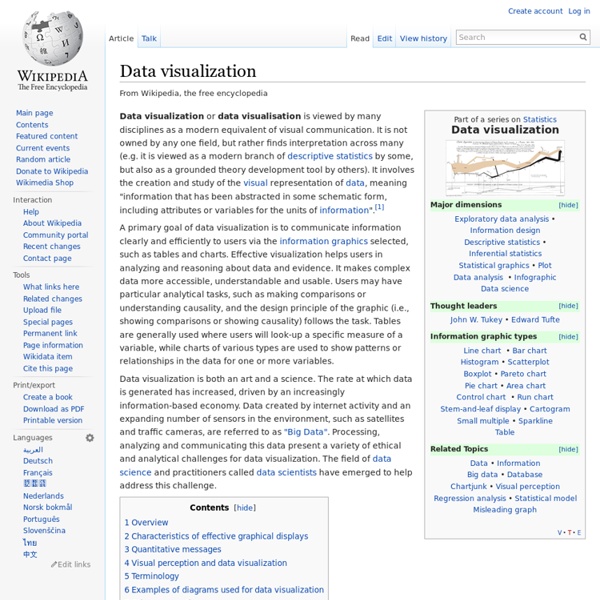Latent class model
In statistics, a latent class model (LCM) relates a set of observed (usually discrete) multivariate variables to a set of latent variables. It is a type of latent variable model. It is called a latent class model because the latent variable is discrete. A class is characterized by a pattern of conditional probabilities that indicate the chance that variables take on certain values.
Data Visualization: Modern Approaches
About The Author Vitaly Friedman loves beautiful content and doesn’t like to give in easily. When he is not writing or speaking at a conference, he’s most probably running … More about Vitaly Friedman …
What Exactly Is Visualization?
I love a good visualization. I’ve always been fascinated by those images that manage to inform and entertain at the same time. From time to time I’ve tried to supply tips and insight to help those interested in creating better visualizations. One morning while researching data visualizations I thought to myself “what really makes up visualization”, is it definable?
Dashboard (business)
Business Dashboards. Simple, communicates easilyMinimum distractions...it could cause confusionSupports organized business with meaning and useful dataApplies human visual perception to visual presentation of information In management information systems, a dashboard is "An easy to read, often single page, real-time user interface, showing a graphical presentation of the current status (snapshot) and historical trends of an organization’s key performance indicators (KPIs) to enable instantaneous and informed decisions to be made at a glance."[3]
Data, Information, Knowledge and Wisdom
From SystemsWiki by Gene Bellinger, Durval Castro, Anthony Mills There is probably no segment of activity in the world attracting as much attention at present as that of knowledge management. Yet as I entered this arena of activity I quickly found there didn't seem to be a wealth of sources that seemed to make sense in terms of defining what knowledge actually was, and how was it differentiated from data, information, and wisdom. What follows is the current level of understanding I have been able to piece together regarding data, information, knowledge, and wisdom. I figured to understand one of them I had to understand all of them.
Big data
Visualization of daily Wikipedia edits created by IBM. At multiple terabytes in size, the text and images of Wikipedia are an example of big data. Growth of and Digitization of Global Information Storage Capacity Source Big data is a broad term for data sets so large or complex that traditional data processing applications are inadequate.
Data, Information, Knowledge, & Wisdom
by Gene Bellinger, Durval Castro, Anthony Mills There is probably no segment of activity in the world attracting as much attention at present as that of knowledge management. Yet as I entered this arena of activity I quickly found there didn't seem to be a wealth of sources that seemed to make sense in terms of defining what knowledge actually was, and how was it differentiated from data, information, and wisdom. What follows is the current level of understanding I have been able to piece together regarding data, information, knowledge, and wisdom. I figured to understand one of them I had to understand all of them. According to Russell Ackoff, a systems theorist and professor of organizational change, the content of the human mind can be classified into five categories:
In-memory database
An in-memory database (IMDB; also main memory database system or MMDB or memory resident database) is a database management system that primarily relies on main memory for computer data storage. It is contrasted with database management systems that employ a disk storage mechanism. Main memory databases are faster than disk-optimized databases since the internal optimization algorithms are simpler and execute fewer CPU instructions. Accessing data in memory eliminates seek time when querying the data, which provides faster and more predictable performance than disk.[1][2] In applications where response time is critical, such as telecommunications network equipment and mobile advertising networks, main memory databases are often used.[3] IMDBs have gained a lot of traction, especially in the data analytics space, starting mid-2000s mainly due to cheaper RAM.[4][5]
Phronesis
Phronēsis ( Greek : φρόνησις) is the Greek word for wisdom or intelligence which is a common topic of discussion in philosophy . In Aristotelian Ethics , for example in the Nicomachean Ethics it is distinguished from other words for wisdom and intellectual virtues – such as episteme and techne – as the virtue of practical thought. For this reason, when it is not simply translated by words meaning wisdom or intelligence, it is often translated as " practical wisdom ", and sometimes (more traditionally) as " prudence ", from Latin prudentia .
R FAQ: How can I subset a data set?
Frequently Asked Questions about R How can I subset a data set? The R program (as a text file) for all the code on this page. Subsetting is a very important component of data management and there are several ways that one can subset data in R.



